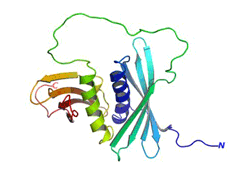
| Serial No. | GA-P0050HU |
| Species | Human |
| Specification | 0.1 mg/0.2mg |
| Brand | GenAsia |
| Origin | Shanghai |
| Price | US$350/US$620 |
Detailed information
1 Host: Escherichia coli (E. coli)
2 Species: Human
3 Protein Type: Recombinant
4 Synonyms: FH3, HCHOLA3, LDLCQ1, NARC-1, NARC1, PC9, AI415265, AI747682, Narc1
5 Purity: 95% by SDS-PAGE
6 Application: WB、 Elisa、 Functional Studies
7 Background:
Proprotein convertase subtilisin/kexin type 9 (PCSK9), is an enzyme which in humans is encoded by the PCSK9 gene. This gene encodes a proprotein convertase belonging to the proteinase K subfamily of the secretory subtilase family. This protein plays a major regulatory role in cholesterol homeostasis. PCSK9 binds to the epidermal growth factor-like repeat A (EGF-A) domain of the low-density lipoprotein receptor (LDLR), inducing LDLR degradation. PCSK9 may also have a role in the differentiation of cortical neurons. Mutations in this gene have been associated with a rare form of autosomal dominant familial hypercholesterolemia (HCHOLA3).
8 Storage&Stability:
Avoid repeated freeze and thaw cycle.Store at 2-8℃ for delivery and store at -20 or -70℃ for future use. The loss rate of the target protein which describes the stability was determined by accelerated thermal degradation test.That is to incubate the protein at 37℃ for 48h and no obvious degradation and precipitation were observed.The loss of this protein is less than 5% within the expiration date under appropriate storage condition.
2 Species: Human
3 Protein Type: Recombinant
4 Synonyms: FH3, HCHOLA3, LDLCQ1, NARC-1, NARC1, PC9, AI415265, AI747682, Narc1
5 Purity: 95% by SDS-PAGE
6 Application: WB、 Elisa、 Functional Studies
7 Background:
Proprotein convertase subtilisin/kexin type 9 (PCSK9), is an enzyme which in humans is encoded by the PCSK9 gene. This gene encodes a proprotein convertase belonging to the proteinase K subfamily of the secretory subtilase family. This protein plays a major regulatory role in cholesterol homeostasis. PCSK9 binds to the epidermal growth factor-like repeat A (EGF-A) domain of the low-density lipoprotein receptor (LDLR), inducing LDLR degradation. PCSK9 may also have a role in the differentiation of cortical neurons. Mutations in this gene have been associated with a rare form of autosomal dominant familial hypercholesterolemia (HCHOLA3).
8 Storage&Stability:
Avoid repeated freeze and thaw cycle.Store at 2-8℃ for delivery and store at -20 or -70℃ for future use. The loss rate of the target protein which describes the stability was determined by accelerated thermal degradation test.That is to incubate the protein at 37℃ for 48h and no obvious degradation and precipitation were observed.The loss of this protein is less than 5% within the expiration date under appropriate storage condition.








